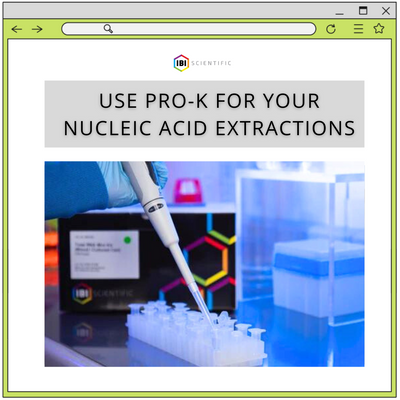

Table of Contents:
- What is recombinant Pro-K, and what can I use it for?
- How does enzymatic activity and stability of recombinant compare to native Pro-K?
- What is important to know about how Pro-K has been expressed?
- What is the difference between recombinant Pro-K powder vs. solution?
- What is important to know about optimal storage conditions for Pro-K?
- Discover IBI Scientific's recombinant Pro-K for your Reseach Success
Significant native Proteinase K (Pro-K) shortages attributed to the COVID-19 pandemic have had far reaching effects across the life science research field (read more in our previous blog). At this time, it is unknown how long the native product supply chain will remain inaccessible to manufacturers and researchers alike. Due to the sudden shortage, IBI Scientific now manufactures a quality, equitable product for life science researchers’ critical work-- recombinant Proteinase K.
With IBI Scientific’s recombinant Proteinase K, research world-wide proceeds unencumbered with results identical to that of native Pro-K. Not all recombinant Pro-K products are created equally, however. Keep reading to find out everything you need to know while using recombinant Proteinase K for your research.
What is recombinant Proteinase K and what can I use it for?
IBI Scientific’s recombinant Proteinase K powder, originally isolated from the fungus Engyodontium album, is a serine protease with broad substrate specificity and relatively high proteolytic activity. It preferentially cleaves ester and peptide bonds adjacent to the C-termini of hydrophobic, aliphatic, or aromatic amino acids. Proteinase K is used to digest proteins during RNA or DNA extraction and to inactivate nucleases that could degrade DNA or RNA. It also removes endotoxins and promotes cell lysis.
How does the enzymatic activity and stability of recombinant compare to native Pro-K?
One of the most important questions surrounding recombinant Pro-K is whether the enzymatic activity is equal to that of native Pro-K. The enzymatic activity of IBI Scientific’s recombinant Pro-K is verified using the absorbance A275 as the vertical axis and different concentrations of tyrosine as the horizontal axis, a standard curve was drawn and the enzymatic activity is calculated at >30U/mg. This is directly comparable to native Pro-K’s enzymatic activity. IBI recombinant Pro-K was stored at 4 degrees Celsius for 1 year and each month an enzymatic activity assay was performed. The activity of the Pro-K was maintained to over 95% of its original value after 1 year of storage at 4°C, demonstrating its excellent stability.
What is important to know about how Pro-K has been expressed?
IBI recombinant Proteinase K is expressed in pichia pastoris cells with cloned gene encoding Engyodontium album optimized by site-directed mutagenesis. The molecular weight is 28.5kda and purity, as measured by SDS PAGE, is >95%. We express in pichia pastoris because this growth system does NOT produce endotoxins, meaning you will not have to test for them.

What are the differences between recombinant Proteinase K powder vs. solution?
IBI Scientific provides PCR Grade, recombinant Proteinase K in powder form (100mg and 200mg) as well as ready to use 20mg/ml solution bottled in 5ml volume. See directions below for how to dissolve Pro-K powder into a 20mg/ml concentration solution:
50mM Tris, 3mM CaCl2, 50% Glycerol, adjust pH to 8.0 with either HCl or NaOH
- Dissolve solids in 50% volume of Certified Nuclease Free Water (IB42100)
- QS to 95% with glycerol. pH to 8.0 using HCL or NaOH
- QS to 100% volume with glycerol
- Recheck check pH using a different meter
- Mix well using a sterile stir bar and filter through a 0.2 micron sterile filter
- Store buffer at 4°C and let chill before preparing Pro-K solution
- Using cold buffer, remove Proteinase K from freezer and dilute powder to 10mg/ mL with buffer. Mix well using a stir bar. Filter solution through a 1.2 micron PES membrane syringe or disc filter and aseptically fill into final container. Aliquot and store at -20°C.
- Use containers and materials that have low protein binding characteristics.
- This formulation will provide the most common solution used for nucleic acid extraction procedures at an optimum pH of 8.0.
What is important to know about optimal storage conditions for Proteinase K?
- -20° C for up to 2 years
- 4° C for up to 18 months
- Room temperature for up to 12 months
- Make aliquots for multiple uses
- Avoid repeated freeze-thaw cycles

Discover IBI Scientific’s recombinant Proteinase K for Your Research Success
Despite industry-wide shortages, your experiments can proceed without delay. The development of recombinant Proteinase K provides a proven alternative to native Pro-K and performs to the same specificity.
Find reliability and unbeatable price when you choose IBI Scientific’s recombinant Proteinase K, or try one of our other popular products:
PCR Products | Ultra-Pure Water
If you need help selecting the right nucleic acid extraction kits to meet your life science research needs, contact us at info@ibisci.com.
Written by: Rebecca Peterson


